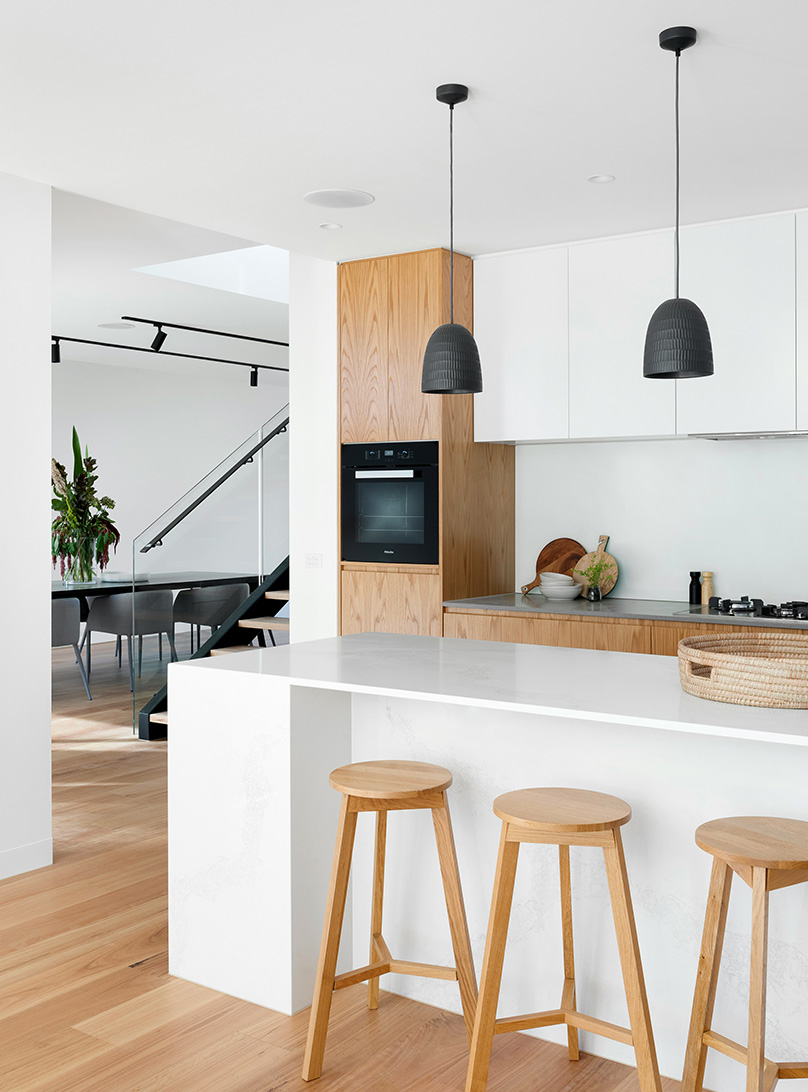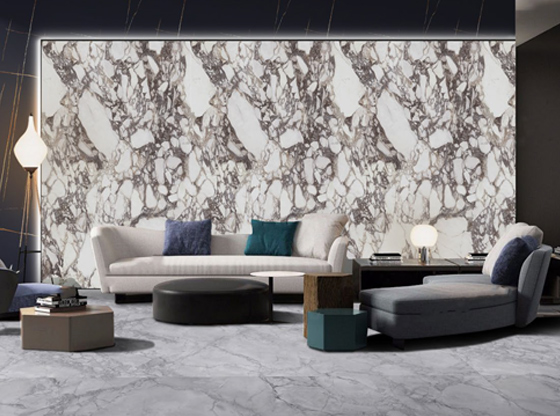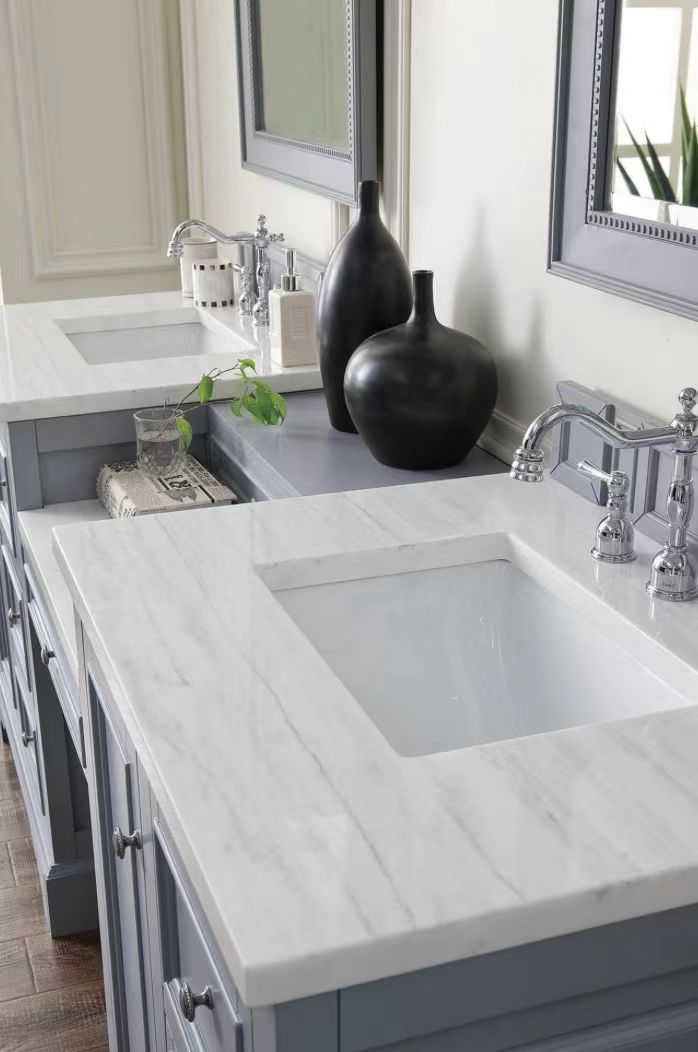Engineered Quartz Surface
Quartz is composed of 93% natural Quartz particles, combined with pigments and resins to produce an extremely durable countertop product. Because quartz is non-porous, it is resistant to most stains and bacteria. Quartz does not need to be sealed.
Here are a few basic tips for quartz countertop cleaning and care:
• Clean up spills immediately–especially oil and acidic foods, such as tomato sauce, wine, coffee, fruit juice and soda.
• Products specifically made for cleaning quartz are recommended for everyday cleaning.
• If quartz or stone cleaners are not available, use a damp sponge or microfiber cloth with warm water and mild dish soap to clean spills and loosen dirt. Repeated use of dish soap could cause residue build-up and diminish the quartz’s shine.
• Although quartz is heat resistant, manufacturers recommend the use of a hot pad or trivet under very hot pots or pans when placing them on the countertops.
• Using a knife on your quartz countertops can damage the knife and possibly damage the quartz.
Always use a cutting board on your countertop surface.
Under ordinary use, dark quartz colors will show dirt, dust, fingerprints and watermarks more readily than lighter-colored surfaces. Naturally, these colors will require more maintenance to maintain their appearance.
Quartz is not recommended for use in outdoor applications because direct sunlight, over an extended period, will cause fading, and may also produce warping or cracking.


Sintered Stone
1. Wipe clean with a damp cloth soaked in regular detergent and water, if the stone surface is routinely cleaned and kept dry.
2. To avoid polished / glazed surface from scratching when cleaning, only use cloth made of soft fibres, suitable for cleaning of glass, kitchen appliance and nonstick frying pans.
3. Substances(eg. Acidic foods, beverages, oils, cosmetics, and the like ) should be avoid to leave dry on its surface.
4. Cif cream can be used to remove most marks and domestic stains easily, but abrasive products is not recommended on polished surface.
How to remove stubborn stains?
1. Limescale – use an acid-based detergent. Rinse surface with lots of water and use clean microfibre cloth to wipe dry.
2. Greasy and Oily Substances – use mild or degreasing detergent. Rinse surface with lots of water and use clean microfibre cloth to wipe dry.
3. Ink/Permanent Marker/Nail Varnish/Expanding Foam – use thinner-based detergents. Rinse surface with lots of water and use clean microfibre cloth to wipe dry.
It’s always advisable to perform a preliminary test on a less-visible area of the stone, to verify if the chosen cleaning product and method are suitable for you and will not cause any damage to the surface.
Caution
1. Do not use sharp, metal object to clean the surface.
2. Avoid pulling or dragging kitchenware, frying pans and other appliances on the surface.
3. To avoid scratching the surface. Do not chop directly on the work surface because some knives might contain diamond particles.
4. Cleaning products ( oily soap, film-forming products) must be taken away from the surface as such agents will leave reside on the surface.
5. Avoid standing or kneeling on the surface. Too much weight pressure might cause breakage on the vulnerable areas ( eg. sinks and hobs)
6. Avoid overloading or stacking heaving objects on the surface.
7. Do not use hydrofluoric acid, caustic soda or products with PH value greater than 11 to clean the surface.
8. Avoid falling off the blunt objects on surface, these can cause cracks that is hard to mend.
9. After installation, surface must be covered and protected while other works are still carrying out on site.
10. Sintered Stone products are highly heat and fire resistant.However, to prevent possible damage, avoid sudden and rapid temperature, direct contact with flame, radiations as well as placement near objects with extremely high temperatures. We recommend using hot pads or trivets should any hot object be put on the top.
Acrylic Solid Surface
Acrylic solid surface countertops are pretty easy to maintain and sets it apart from natural stone countertops. Failing to properly maintain natural stone countertops can lead to problems because its pores make it stain easily and can promote bacterial growth.
But that doesn’t mean that you can get careless. Durable as they are, solid surfaces are not invulnerable. With that in mind, here are a few essential tips you need to know and do to keep your solid surface countertop in good condition for years to come.
1. Don’t Cut Your Edibles Directly on The Surface
Solid surface countertops are soft materials, and cutting directly on these surfaces will cause chipping or scratching. Always use a cutting board.
Chips and scratches aren’t only aesthetically unpleasant but will also catch stains easily and poses a hygiene hazard when gunk and germs start to clog and fester. It’s also not easy to clean it out.
2. Always Use a Trivet or Hot Pad — Don’t Melt The Surface!
Polyester typically has a melting point of 260 ºC , while acrylic at around 160 ºC. When cooking it’s common for a pan on a stove to get as hot as 166 ºC, if not hotter.
Thus, putting a hot pan or dish directly onto an acrylic countertop is a no-no. Even on polyester, it just isn’t a very good idea.
3. Avoid Scrubbing With Anything Abrasive
Don’t get the wise idea that more is better and start using abrasive scrubbers, thinking it would remove a tough stain; because it’s going to remove more than that!
Scrubbing with an abrasive scrub can cause fine scratching to something much worse. The severity of the damage can range from dulling to outright gashing.
This type of damage is particularly noticeable on dark coloured, high-gloss finishes. Minor scratching can be polished away with the right tools and technique. Depending on your level of knowledge, you might want to consider D.I.Y. repairs as detailed in the point below.
4. D.I.Y. Repairs Are Convenient, But Don’t Botch It!
It’s always tempting to want to do your own repairs, but it’s important to first assess the type and extent of damage.
While it is possible to gently polish away minor scratching, deep cracks and nicks require filling with cyanoacrylate (super glue) or epoxy filler. More severe damage may require a new piece of solid surface material cut out to replace the damaged parts. This task could be too complex for the average homeowner to accomplish.
Therefore, it might be better to get a professional with the right tools, replacement parts and skills to have a look at the problem.
5. Avoid Strong Chemical Cleaners
Avoid strong cleaners like bleach, thinners or acetone. Use ammonia-based cleaning products or soap and water instead. Strong cleaners have a nasty habit of leaving solid surfaces marked or discoloured. If any of these cleaners do come into contact it is best to wash it away quickly with soap and a flush of water.
Glass cleaners are ammonia-based and are abundant on the market; most hardware stores should carry them. Glass cleaners contain ammonia, a weak base, which is perfect to clean solid surface countertops with.Vinegar can be used to dissolve calciferous buildup (white calcium salt).


Artificial Grass
●Artificial grass is the ideal surface material with less complicated maintenance.
● When install(lay out) the grass roll, be sure to follow the same directions of each roll, so that the grass blades bend towards the same direction, or the pitch may have different color shades under sunlight.
● Before laying out the grass, please build certain drainage for sub-base to prevent the underpart of the turf from being soaked by rain.
● Do not drop cigarette butts, set off fire, spit gum, spill alcohol, gasoline or other organic solvents on the grtificial grass at any time.
● Clean the turf at least once a month. Brushes with metallic fibers or hard bristles are strictly prohibited.
● Carry out football match on landscape grass will accelerated the wear of yarn blade.So improper usage are prohibited.



